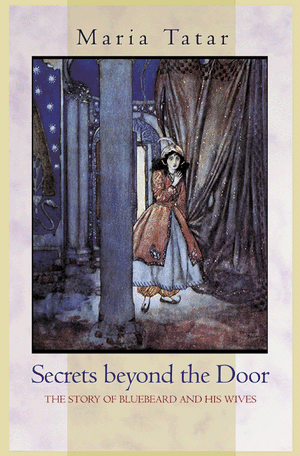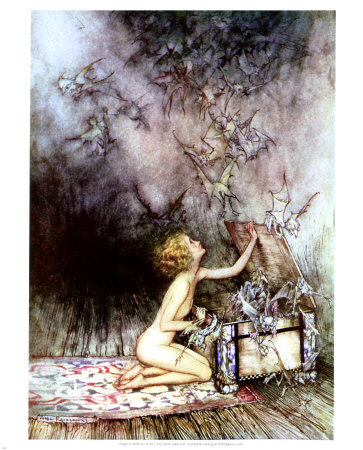Women are always getting the rap for bringing evil knowledge into the world.
Who makes up these myths anyway? Hint: it's not a woman.
What is up with this cautionary attitude about women and knowledge?
Bluebeard's wife: Bluebeard left for a few days, giving his wife all the keys to the house. But he warned her not to use this tiny key, not to go into this certain room. And so she did, and found there all the skulls and bones of Bluebeard's previous wives that he had murdered.
Lot's wife: In the Bible, God has decided to destroy two corrupt cities, Sodom and Gamorrah, but he gives Mr. and Mrs. Lot a free pass out of the city before the destruction. He warns them not to look back. But Mrs. Lot still had family back there, so she couldn't resist turning around for one last look. And God turned her into a pillar of salt.
Googling the names of all these women together reveals that I am certainly not the first to have thought about this. Maria Tatar in Secrets Beyond the Door discusses "woman's problematic relationship to knowledge."
 "The intellectual curiosity of men may have given us fire, divided us from animals and given us civilization, but the curiosity of women --as we know from the stories of Pandora, Eve, Psyche and Lot's wife, among others -- has given rise to misery, evil and grief."
"The intellectual curiosity of men may have given us fire, divided us from animals and given us civilization, but the curiosity of women --as we know from the stories of Pandora, Eve, Psyche and Lot's wife, among others -- has given rise to misery, evil and grief."I'm not familiar with the myth of Psyche. But do I even need to mention the Taliban and the women they have killed while the women headed to school or sat in the classroom?
Why? What's in it for the myth-makers if women eschew wider knowledge? Will we otherwise become harder to manage? Bad mothers who will neglect our children? Threatening competitors for jobs and resources?
In "Gender Roles in Cross-cultural Contexts," Joan Gregg writes:
"Some theorists assume that biological factors will always prevent women from moving outside their traditional sexual-biological roles into economic or political roles outside the family.
"They state that even in the changing family structure of modernized societies, made possible by safe, easy contraception and bottle-feeding, the role that will bring most fulfillment to women is the maternal-housekeeping one.
"These social scientists claim that the woman's role has always been essential in transmitting cultural values from one generation to the next and that this conservative function is a key to social stability.
"Its form will perhaps change somewhat, but in its most important aspects it will remain what it has been in almost every culture for thousands of years."
Whew! So all cultural stability depends upon women's willingness to forego knowledge outside the home? That's a heavy load. And we're stuck with this quandary for the next thousand years?






14 comments:
"What is up with this cautionary attitude about women and knowledge?"
You just had to ask, didn't you?
Don't give in to curiousity, don't investigate your suspicions, don't harbor longings... obey authority and do it meekly, silently, happily!
You'd enjoy J.K. Rowling's new book, "Tales of Beedle the Bard"; it's just the kind of new story book we earlier said had to be written.
Sounds intriguing. I had not even heard of it, but I was wondering what Rowling was going to do with herself now that she put the Potter series to bed. As usual, it will be awhile until I get to pleasure reading again, except in small doses.
Ah! Then this is the perfect bedside book for you right now; all the stories are very brief, artfully so. It IS riding on the HP coat tails, so each one is followed by an "analysis" from the esteemed professor Dumbledore, but those annotations only allow Rowling to say more about her own critiques of literary culture.
My daughter studied the Greek myths in fourth grade, and we read them at home, too. We were struck with how often the female characters were punished for their romantic escapades as well as their curiosity or disobedience. The Grimm Brothers' classics get tough reviews here, too. We figure those boys must have had an evil stepmother themselves. The only women with power in those tales are witches and they're not benevolent ones.
The bedtime stories we're reading right now are a curious blend of mysogyny and heroine glory: Tales from 1001 Arabian Nights. The narrator is, of course, Sheherizad, whose clever imagination saves her own neck as well as that of countless other women-- by intriguing her heart-broken-thus-obesessively-bride-killing betrothed into keeping her alive to continue telling stories.... There are slave girls of mythic beauty, enchantresses, cruel wives but also quick-witted female geniuses. It really eclipses the whole helpless princess genre for action, magic and vivid characters.
The power of knowledge, and tales that caution against seeking it, seem quite universal and ancient. Understandably, since so much of our technology has meant additional burdens as well as convenience. I don't know if our western culture has a disproportionate emphasis on warning/blaming women specifically. That focus does strike me as originating from a fear of women being diverted from the "maternal-housekeeping" role: that might mean someone else would have to do dishes while moms discuss the meaning of life and the true nature of social stability....
1001 Nights is brimming with good stories!
In defense of the Brothers Grimm, they did not make up those stories; they simply collected them, like Joseph Campbell without the analysis. They were both such excellent students of culture and language that Jacob Grimm was the first to notice similarities in languages (between Sanskrit and English) that led to the discovery of the proto-language Indo-European.
Enjoyed your discussion of women and knowledge. Missed mention of Greek oracles (female), Sappho, and Plato vs. Francis Bacon on gender and knowledge.
Wise, knowing women are ever so much more fascinating than their opposites.
Hallelujah, Silver Bee.
Imagination is more important than knowledge. Knowledge is limited. Imagination encircles the world.
Hell YEAH, Suzy! You said it, sister. And no one can limit your imagination.
Yet, there is an argument to be made for keeping our imaginations in check and, for example, looking both ways before we cross the street.
There's no arguing with that, Anonymous. Imagination, yes, but with both feet on the ground. I agree.
Thanks for redeeming the Brother Grimm for me, Indie (though their collections remains grim). And your recent post about Easter in Sweden reminds me of Baba Yaga, one of my favorite powerful witch characters in folktales. Glad to see Silver Bee's additions to the list as well!
Before Suzy B.B., it was Einstein who said that imagination is more important than knowledge. But he didn't mean it in the sense that it's better to live in a fantasy world than to observe the real one. He warned that the problems of tomorrow will not be solved by the same kind of thinking that created them. Discovery and innovation require curious minds.
I'm sure Einstein would have loved to talk quantum physics with Suzy.
Postscript, I don't think anyone can limit YOUR imagination, Indie (or Suzy's clearly), but there is neurological research that shows early experiences do affect the developmental potential of that part of the brain. Keep TVs and toys that play themselves away from babies and toddlers is what the evidence says: tell them stories and let them explore.
How about Athena, ever-single goddess of the hunt, born straight out of Zeus' head?
I thought it was Venus who sprang full grown from Zeus's head. Clearly, I need to brush up on my mythology.
Or maybe women just sprang from his head on a regular basis? Like ideas.
The Egyptian hieroglyph for "goddess" was a serpent. The symbols for the diety and the serpent were one and the same. The serpent and the goddess were not only identified mythologically but were joined as an integral part of the language as well.
Post a Comment